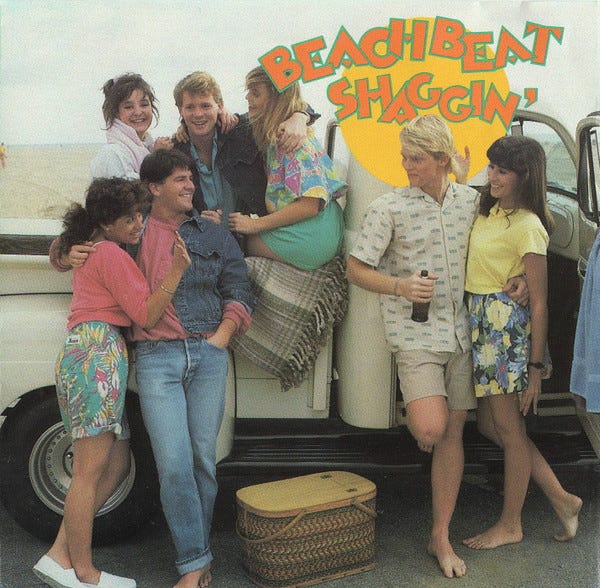Genre of the Day - Beach Music
Album of the Day - Beachbeat Shaggin’ by Various Artists (Compilation, 1987)
I briefly depart from my usual, and central, tenet of this column today that the genres be randomly selected ensuring maximum musical variety. Nonetheless, rules are meant to be bent. When I saw that today’s musical form was added as a genre on RateYourMusic a few weeks ago, and the site already has over 2,300 genres listed in its vast catalogs, I felt that it would be rife with potential musings of how we consider music and natural spaces and sunny escapism. I’m headed to the beach in Santa Barbara for the weekend, my first sojourn by the ocean during warm weather this year, and it felt only fitting.
While today’s genre didn’t develop until the mid-20th century, it feels odd to consider that the essential simplicity of spending time at the beach as we know it is also a result of modern social phenomena. With the Industrial Revolution’s leaps forward in people’s understandings of the way urban environments affected health, the English upper class flocked towards a place that had historically been the perilous realm of sailors and fishermen. The purity of the sea seemed to promise the alleviation of all sorts of maladies and anxieties. No wonder the English have a word all their own that implies at least some beachgoing component: they holiday in Cornwall, Mallorca, or descend on somewhere more far-flung. Trains brought people across Europe to the shores and by the late 1800s British notions of beach-centered vacation culture had spread across the continent and beyond.
About a hundred years later on the temperate shores of the warm Atlantic Ocean (at least in comparison to the bone-chilling Pacific), a genre would be dubbed the music of the beaches—at least among the beachgoers of a few US states. Beach music is interchangeably called Carolina beach music, the mid-20th century sound shaking out of the beach towns lining the shores of the Carolinas and Georgia.
The genre emerged in Myrtle Beach, and while the genre's themes typically revolve around the carefreeness a beach vacation typically entails, beach music also has a poignant place in musical history for being a part of bridging the gap between the jazz era and rock’n’roll era and playing a role in greater acceptance of Black American musical styles among white Americans. Music is perhaps the most fluid form of art, as even the harshest Jim Crow segregation laws on music stipulating that Black records wouldn’t be played in white establishments didn’t stop Myrtle Beach’s white teenagers who heard popular Black records out and about from requesting their favorites in the white dancing clubs. College kids who came to the beach clubs brought those records back to campus with them, and the trend fanned out up and down the coast. A dance called the shag emerged, a blues shuffle with a dizzying emphasis on spinning. The records preferred by these shaggers were soulful but lighthearted, lyrically celebrating youth, summertime, and the beach, with a soft touch of jazz swing.
Today’s 1987 compilation, which unfortunately isn’t available cohesively on Spotify but is available via playlist, features many of the biggest jukebox mainstays of the peak of beach music. “I Love Beach Music” is a straightforward metacommentary and appreciation of the genre, recorded seemingly for or around the time of this set rather than during beach music’s original heyday as the genre’s name didn’t come into use until the ‘80s to characterize the records making waves on the Carolina beaches a couple of decades prior. “Summertime’s Calling Me” is another latecomer to the beach music scene, released in 1975—though shagging remains beloved, and beach music is celebrated annually in North Carolina in its own festival—with Chicago-esque horns and golden harmonies. A lot of tunes here speak to wider ‘50s musical trends, like the good-old gibberish chorus of “Te-Ta-Te-Ta-Ta,” but most feature a consistent, distinctive sonic pattern centered on horns celebratory charm, exuberant vocals, and a general simplicity that reflects the simple demands of a beach journey—to connect with the water and sand and sun, and to lay down one’s troubles to get washed away by the tide. I’ll be spinning my way to the shore with these thoughts in mind tomorrow, and I hope you get to go to a beach soon—if not, let this music draw you there.





I always thought of beach music being from California for some reason. But it makes sense that it started on the east coast. I learned something new today. Thanks.
Loved the playlist, may I suggest an addition: https://youtu.be/I3dY4BKaCXw?si=tIQzMvwG9P0dkzwu